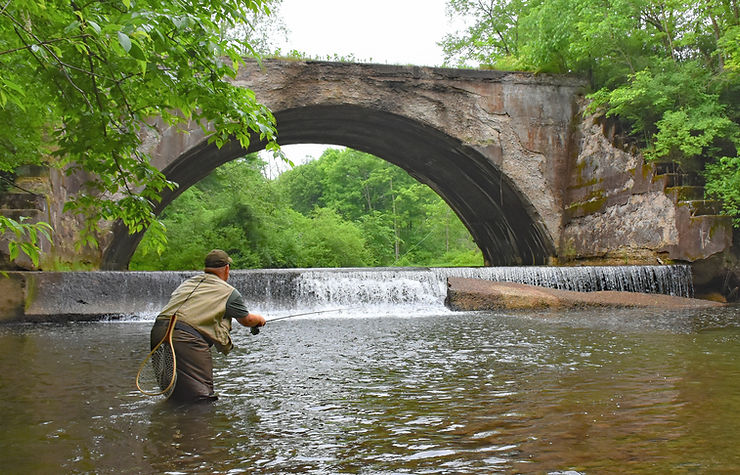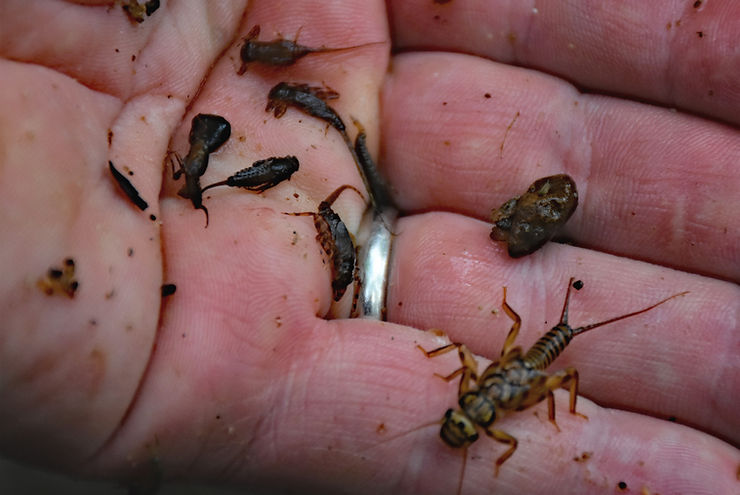Little Sandy Creek, Venango County PA

My first success with nymphing came on Little Sandy Creek some 20 years ago, when I discovered this scenic little freestone stream less than an hour from my house. Its diminutive size made it easy to get my fly in front of fish and learn the basic skills of casting in tight cover. But I’ve kept going back all of these years for another reason – there are enough wild browns there to keep you humble.
Little Sandy Creek begins just east of Lake Wilhelm in Mercer County, PA, and flows southeast for approximately six miles before emptying into Sandy Creek near the town of Polk. The headwaters are small until the stream crosses into Venango County, but good fishing for native brookies and wild browns can be had if stealth is your game. The lower five miles of the stream are stocked, and 1.3 miles of that, from the foot bridge near the parking area at the end of Pump House Road downstream to Polk, is Catch and Release Fly Fishing Only (CRFFO).
Little Sandy Creek is stocked twice a year by the Pennsylvania Fish & Boat Commission (PFBC), usually once in early March and again in late April. Its early stocking makes it a favorite for anglers looking to shake off their cabin fever.
Access is excellent via any of the bridges that cross the stream which also serve as stocking points. The bridges on Sandy Creek Road and State Route 62 cross the lower end of the CRFFO. At the town of Polk, turn north onto Valley Road and then right onto Pump Station Road to access the top end of the CRFFO. Continue north on Valley Road and any of the local roads turning right will lead you to bridges that cross Little Sandy Creek. These include Rainbow Road, Whippoorwill Road, Noggle Road, and Dean Road.
Little Sandy Creek is incredibly fertile. Flip a few rocks or dip a seine into the current and you’ll come up with a diverse assortment of aquatic life. This stream has all of the classic mayfly hatches.
Starting in mid-April, you can expect to see Little Blue-Winged Olives (#20), Blue Quills (#18), Quill Gordons (#14), Hendricksons and Red Quills (#14), and Grannoms (#16). By mid-May those hatches give way to Sulphurs (#16), Gray Fox (#14), March Brown (#12), a slightly larger Blue-Winged Olive (#14), Green Drakes and Coffin Flies (#10), Light Cahills (#14), and a few others. Even summertime can produce hatches of Slate Drakes and Yellow Drakes (both #12) but by then terrestrials are the most reliable producers on the surface.

Any traditional nymph pattern will produce fish year round, too. Working a streamer through deeper pools can produce some large wild and holdover browns.
Little Sandy Creek has an interesting history. According to Charles Meck in his book, Pennsylvania Trout Steams and Their Hatches, the stream has always been known for its big wild browns. In 1958, the PFBC allegedly poisoned the browns in an attempt to restore the stream to a brook trout fishery. After much lobbying by the Neshannock Chapter of Trout Unlimited, the PFBC resumed stocking Little Sandy Creek with browns in 1978.
In recent years, the PFBC experimented with placing fingerling trout into the CRFFO instead of adult trout. The experiment was unsuccessful and the CRFFO was returned to the adult stocking program.
But that doesn’t mean there aren’t plenty of wild browns and native brook trout present. The entire streams flows under heavy canopy and has a plethora of the undercut banks and other structure that wary trout prefer. Also, for a stream that averages about 30 feet in width, Little Sandy Creek has some surprisingly big pools, the most famous of which is the plunge pool underneath the old railroad arch downstream from Pump House Road. I’ve spent many early June mornings watching uncatchable wild browns rising in this pool.
The woody structure in and around many of the deep pools makes Little Sandy Creek an interesting place to fish. There’s little doubt that almost every good pool is home to at least one trophy wild brown. The problem, of course, is sneaking up on them unnoticed, making the perfect cast, and hooking and landing one of the buggers. That prospect has kept at least one angler coming back for more the past 20 years.
Sign up for the Dark Skies Fly Fishing e-newsletter
It's free, delivered to your inbox approximately three times each month. Your information is always kept private and used for the sole purpose of keeping you up to date on blog posts and specials in the online store.
Sign Up Now